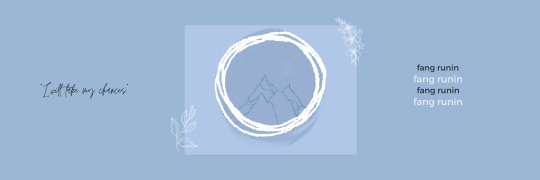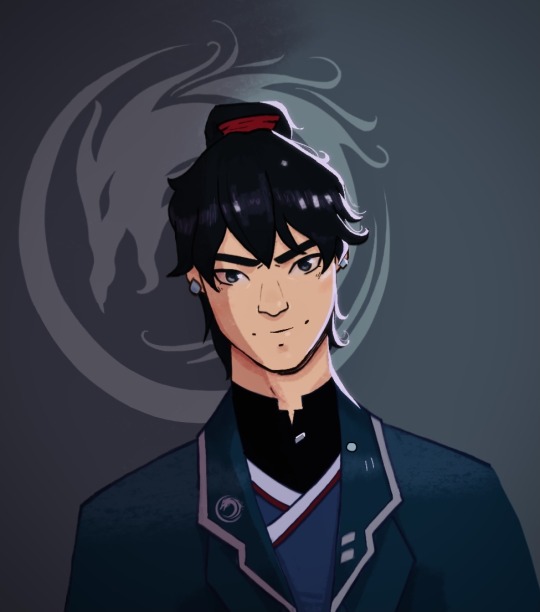Text
This list is purely for my fic writing benefit...
Which Militia Division goes to which Province, since the numbers don’t correspond to the Chinese zodiac. And, for good measure, I’ve listed named characters who we know went to which division, as of the first book.
First Division = Ox Province*
Second Division = Rat Province (Irjah, Kitay)
Third Division = Horse Province* (Kureel, Han*)
Fourth Division = ?
Fifth Division = Tiger Province (Jun Loran, Officer Yenjen)
Sixth Division = ? (Venka**)
Seventh Division = Dragon Province (Nezha)
Eighth Division = Ram Province (Arda, Raban)
Ninth Division = ?
Tenth Division = ?
Eleventh Division = ? (Niang**)
*Not confirmed in-text, but likely based on context.
**These divisions might have gotten switched in-text. When Kitay tells Rin where their classmates have been deployed, Venka is in the Sixth which is going to Golyn Niis, while Niang is in the Eleventh. By the time we get to the Golyn Niis chapter, the narrative reports that it was defended by the Second, Ninth, and Eleventh Divisions, which would place Niang there instead of Venka if we go by the initial report. So, it should be the Second, Ninth, and Sixth Divisions that were defending Golyn Niis.
12 notes
·
View notes
Text
“You asked how large my sorrow is and I answered, like a river in spring flowing east.” - Nezha, The Dragon Republic
*clenches fist* This is one of the most famous lines of Chinese poetry. I love it so much. Nezha, why do you do this to me.
Background:
It was written by Li Yu, a disposed ruler of a state that existed in the transitional era between Tang and Song dynasties. The capital of the state he ruled was actually modern day Nanjing, and he surrendered the city when the Emperor of the Song dynasty sent the army to attack. Afterwards, he lived as a political prisoner in another city before he was poisoned some years later and died.
This famous line is indeed from his last poem, written on the night before he died. It’s fitting to be recited in TDR because it laments the decline of a state, and indeed in TDR we are in a state of transition from one “era” of Nikara to the next.
Li Yu is kind of remarkable to me because he was very much a scholarly person, very talented in the arts, and really not suited to be a ruler. To be born into royalty was very much to live a privileged yet cursed life.
The Poem:
Li Yu remarks on his life briefly, as it has had a lot of ups and downs. He has had both a very good life filled with pleasures, and experienced great sorrows. He sort of questions living, perhaps as a sort of “all of the good things and also bad things have come and gone, what’s the point of it all?” and makes an observation: the cold east wind blows through his residence.
The world moves on without him. I like this aspect of Chinese poetry, when they point out how the world will keep moving, the seasons keep turning, in the end the world itself is not cruel nor does it bring hardship to people on purpose - the world just is, hardship is part of life. Also, it doesn’t mean the heavens and gods are out to get you, what could the universe care about a single person’s sorrows?
Li Yu then laments about the country he has lost, how he can barely bear to think of it. Then the line that Nezha speaks:
How much sorrow can one man have to bear?
As much as a river of spring water flowing east. (translation by chinese-poems.com)
It’s one of the most memorable lines of Chinese poetry, perhaps because of its simplicity. Most poetry speaks of the depths of the pain associated with sadness, but Li Yu says, if you want to know how sad I am, simply look at the spring river. It’s very much understated, and I think that’s the appeal.
To understand it, I’ll bring up another poem I really like by Xin Qiji (some lines omitted):
When I was young, I knew not the taste of sorrow
I loved to climb the high towers
To compose a new song, urging myself to talk of sorrow
Now that I have known all the taste of sorrow,
I would like to talk about it, but refrain
Instead I say, “It is chilly, what a fine autumn!” (translation clobbered together from various sources)
The main point of Xin’s poem is that at some point, you’ve experienced so much sorrow in your life that you no longer have the words to describe it. No words would be sufficient to describe that depths of that pain. All you can do is sigh and remark on how nice the weather is.
Li Yu’s poem, I feel, gives a similar sentiment but he does attach an image of a river to his feelings. A spring river is powerful, it flows in one direction, never to return to the same place twice. His life was also like that, all good and bad things have now passed, the previous era has been whisked away.
28 notes
·
View notes
Text




the poppy war
39 notes
·
View notes
Text
There is such (narrative) irony in the fact that Rin’s new enemy by the end of TDR is both the Dragon Republic + Hesperia, yet to fight them she’ll use the Phoenix’s power.
The Phoenix is clearly based on the Vermillion Bird of the South, a mythological creature representing the constellations and associated with the south, fire, and the summer months. However, this bird is not originally associated with rebirth as is the western phoenix. The “phoenix” that is associated with fire + rebirth is a western influence that was not part of Chinese mythology originally, yet it’s become so conflated that people in China today often don’t know the “Chinese phoenix” was never associated with rebirth.
[Aside: there is another “Chinese phoenix” that is paired with the dragon to symbolize a married couple; in Chinese myths, the Vermillion Bird and this phoenix are actually two separate and mostly unrelated entities, though some of the Vermillion Bird’s traits are attributed to the phoenix/fenghuang over time; originally this phoenix is not associated with fire, let alone rebirth]
There is always a bit of underlying “becoming what you hate” in Rin’s story and journey, so to me it’s even more ironic that the power she’s using to defeat her enemies (and said to be a symbol of the south) also has elements to it that are derived from said enemy.
[Since the two Chinese phoenixes are already conflated, let’s add in the fact that the ‘regular’ phoenix is said to only appear during times of prosperity, or to herald the beginning of a new era, and sometimes is said to only appear when there is a ruler who is righteous and without corruption]
24 notes
·
View notes
Text
I still have no idea how to pronounce it, but I did find the origin of Nezha’s father’s name: Vaisra.
Nezha is a deity from Chinese mythology and folk religion, but he originates from two figures from Hindu mythology. One of these is Nalakubar, the son of a Yaksha (yaksha are supernatural beings/nature spirits) king. Nalakubar’s father was called Kubera, and later his name became Vaiśravaṇa, one of the Four Heavenly Kings, when Buddhism came about.
Nezha’s father, in Chinese myth, is a general called Li Jing, which explains the Warlord status.
56 notes
·
View notes
Text
The 27 Classics on the Keju
I might be the only one interested in the fiction/non-fiction parallels in TPW series, but in case anyone else finds this useful one day, I have compiled a list of the classical Chinese texts that may have been featured on the Keju. It was actually incredibly difficult to find 27 classics since I had to omit all of the ones related to warfare, which were only taught at Sinegard in the books.
The first three texts were mentioned in the first book. Zhuangzi was a real philosopher (as were Mengzi and Fuzi), but his compiled works were simply called the Zhuangzi, which was a foundational text on Taoism. The version in TPW is apparently very dry and obtuse, but the real Zhuangzi text has a lot of humorous and interesting anecdotes, fables, and other tales that challenge you to think (and some of which, interpretations are debated to this day). Mengzi was a Confucian philosopher second only to Confucius/Fuzi. His work is also called the Mengzi and does seem to his reflections on his political philosophy after traveling and meeting various rulers. Interestingly, he believed that human nature is innately good. Fuzi is more well known to the West as Confucius, and the Analects are a reflection of his Confucian teachings about what makes a good ruler, and how people should live to be a “君子” (junzi), a gentleman or respectable person (the concept is not innately gendered).
Some of these are not philosophical texts; the Hundred Family Surnames is a list of names children started off learning, the Thousand Character Classic is similarly a starter text in the form of a poem. One of these is actually a dictionary.
Reflections on Statecraft by Mengzi
Annals by Zhuangzi
Analects by Fuzi
Classic of Poetry by Fuzi
Classic of History
Book of Rites
Book of Changes
Great Learning by Zhu Xi
Doctrine of the Mean/The Middle Way by Zisi
Book of Etiquette and Ceremonial by Baode
Rites of Zhou by Baode
Classic of Filial Piety
Progress Towards Correctness (Erya)
The Commentary of Zuo by Zuo Qiuming
The Commentary of Gongyang
The Commentary of Guliang by Guliang
Discussion of Heaven and Human Disposition (Xunzi) by Xun Kuang
The Book of Lord Shang by Shang Yang
Han Feizi by Han Fei
Guiguzi
Thousand Character Classic
Discourses of the State
Writings of Master Shi (Shizi) by Shi Jiao
Writings of the Huainan Masters (Huainanzi)
Records of the Grand Historian by Jima Qian
Master Lü's Spring and Autumn Annals (Lüshi Chunqiu) by Lü Buwei
Dew of the Spring and Autumn Annals by Dong Zhongshu
Hundred Family Surnames
54 notes
·
View notes
Note
the fact that you put in so much effort for the pronounciation guide TTTTT the tpw fandom is so blessed to have you
:3 I’m just glad people find it helpful! Thank you for stopping by!
2 notes
·
View notes
Text
The Poppy War Pronunciation Guide (Updated)
An updated version of my first pronunciation guide, now that I have acquired The Dragon Republic. It will be updated one more time, after I have acquired The Burning God.
The links below will take you to Google Translate; simply click the speaker icon and you will hear a readout of the word.
NOTE: All of these pronunciations are in Mandarin Chinese, and several tonal variations exist of most names (the variations are also linked). I am not aware of a program that will readily read out words in Cantonese or any Chinese dialects.
Fang Runin
• Fāng (方, 坊) or Fáng (房)
• In Cantonese, Fang is pronounced ‘Fong(1)’, (1) indicates a high flat tone. Rin is from the south, which in real life maps onto the southern provinces where Cantonese is commonly spoken.
Yin Nezha
• Yìn (印), Yīn (阴, 殷), Yǐn (尹), Yín (訚)
• Nézha (哪吒) - The pinyin provided by Google Translate is wrong but the pronunciation is correct. His name should read as ‘nuh-ja’.
Nezha’s Siblings
• Jinzha (金吒)
• Mùzhā (木吒)
• Mingzha (明吒) - I used the ‘ming’ meaning ‘bright’ as an example. The Nezha from myth has only two siblings: Jinzha and Muzha.
Chen Kitay
• Chén (陈, 臣, 谌)
Niang
• Niáng (娘), Niàng (酿)
Jiang Ziya
• Jiāng Ziyá (姜子牙) - Both a historical figure and a character in Chinese myths, he was a sage and military strategist who helped overthrow the tyrannical King Zhou of Shang.
Jun Loran
• Jūn (君, 军, 均), Jùn (俊)
• ‘Ran’ might be pronounced like this.
Su Daji
• Sū Dájǐ (蘇妲己) - She is based off the Daji from Chinese myth, whose family was named Su (蘇).
Gods
• Èrláng Shén (二郎神)
• Sānshèngmǔ (三圣母) - In myth, she is Erlang Shen’s sister and the Third Holy Mother of Mount Hua. Both are deities.
• Nǚwā (女娲) - In myth, she is a deity that created humans.
Lan
• Lán (蓝, 兰). This was the name of Kitay’s servant/cook.
Han
• Hán (韩), Hàn (翰). One of their classmates.
Baji
• Bājǐ (巴戟). He is based on Zhu Bajie from Journey to the West. 巴戟 is the name of a plant I used as an example pronunciation.
Jima
• This name reminds me of Sima, but in Mandarin, Jima is the name of a type of insect called a thrip...So if you really want to hear a possible pronunciation of it, Jìmǎ (蓟马).
Liu Gurubai
• Líu (刘), Liǔ (柳)
Cao Charouk
• Cáo (曹)
Gong Takha
• Gōng (宫, 弓, 龚), Gòng (贡)
Chang En
• Cháng (常, 苌), Chāng (昌)
• Ēn (恩)
Chiang Moag
• ‘Chiang’ is the old Wade-Giles transliteration of a Cantonese name, the first that comes to mind is Chiang Kai-shek, whose ‘Chiang’ is ‘Jiang’ in Mandarin. From what I can tell in Cantonese, it’s not actually pronounced with the English ‘ch’ so I have no clue how or why this system chose to write the name this way. In modern jyutping it’s ‘Zoeng’, and that ‘ch/z’ sounds more like an English ‘j’ than a true ‘ch’ as in ‘chat’.
Sunzi, Mengzi, Zhuangzi (philosophers)
• Sūnzi (孫子) - More commonly written as Sun Tze in the West due to an old transliteration system, Sunzi is the pinyin form.
• Mèngzǐ (孟子) - The west knows him as Mencius.
• Zhuāngzi (莊子)
Miscellaneous
• Cike is cìkè (刺客) meaning ‘assassin’.
• Yuelu Mountain is Yuèlù Shān (岳麓山) and it was a real school.
• The Keju is Kējǔ (科举), the name for the imperial examinations.
26 notes
·
View notes
Text
I plan on updating my pronunciation guide now that I have TDR! The last one was posted to my main account, the updated one will be posted here.
2 notes
·
View notes
Text

yes he’s complete trash yes he is also my trash
162 notes
·
View notes
Video
laojun mountain, luoyang, henan province
13K notes
·
View notes
Text
i was thinking a bit about the poppy war, and especially about rin and nezha.
they are two really interesting characters whose personalities, superficially, almost feel the same (example: their reciprocal pettiness during their fist year at sinegard), but you have to barely scratch that surface to see that they are two totally different beings.
the truth is, they were both created to be the opposite of each other, in everything: from their backgrounds (rich kid vs poor peasant), their affections (a popular kid from a loving family vs an orphan with very few friends) and the way they show it (nezha crying for rin at the end of tdr or him calling venka "little sister" vs rin literally saying "fuck you" every time somebody tries to tell her that they care about her), to their powers (water vs fire) and their approach to them (being reluctant to use the powers vs literally being addicted to it).
even their mentalities are different (nezha looks and acts kind of conservative, but if you analyze him you'll see that he has democratic values vs rin is definitely more radical and probably tends to dictatorship).
That's why their dynamics are so great. They make you see two total different faces of the same coin, which can't exist without each other. In some moments it looks like they can collaborate to reach the same goal, but at the end one will prevail on the other.
248 notes
·
View notes
Photo


She was no victim of destiny. She was the last Speerly, commander of the Cike, and a shaman who called the gods to do her bidding. And she would call the gods to do such terrible things.
718 notes
·
View notes
Photo






���They were monsters! They were not human!”
“Have you ever considered, that that was exactly what they thought of us?”
The Poppy War by R.F. Kuang
563 notes
·
View notes
Photo






@literatureofcolor event one: favorite books
R.F. Kuang, The Poppy War: I have become something wonderful, she thought. I have become something terrible. Was she now a goddess or a monster? Perhaps neither. Perhaps both.
472 notes
·
View notes
Text
reblog from my main
The Poppy War Pronunciation Guide
I saw a post recently that made me realize one of these would probably be helpful. But as my ability to pronounce Mandarin is awful, I will be using Google Translate as a resource lol. There are also several ways to pronounce a lot of these names, since Mandarin is a tonal language and we’re never told which character goes with each name. I list the possibilities of each character next to the links.
(I’ve only read the Poppy War and picked up Nezha’s siblings’ names from a tumblr post, so if there are more, just reply to this post and I’ll add it in!)
Also, tumblr sometimes chooses to block outside links from appearing in the tags, so…we’ll see how it goes.
A caveat: I can only offer pronunciation help based on the real Chinese names. I’m as much at a lost as the next person when it comes to the made up ones. Or the Mongol ones. Also, Japanese is pretty easy to pronounce so it is’t included here.
Fang Runin
• Fāng (方, 坊) or Fáng (房).
• In Cantonese, Fang is pronounced ‘Fong(1)’, the (1) indicating the tone.
Yin Nezha
• Unlike when we say yin/yang in English, Yin is actually pronounced with a long ‘e’ rather than a short ‘i’ sound. Yìn (印), Yīn (阴, 殷), Yǐn (尹), Yín (訚)
• Nézha (哪吒). Note that the pinyin in Google Translate is wrong but the pronunciation is correct lol…哪 can be pronounced nǎ in other words, but in this name it should be pronounced né (this ‘e’ sounds more like an ‘uh’ than an English ‘e’).
Yin Yinzha & Yin Muzha
• Yinzha - see above. Pick one of the yins + zha.
• Mùzhā (木吒). A deity. His other brother was originally Jinzha instead of Yinzha.
Chen Kitay
• Chén (陈, 臣, 谌).
Niang
• Niáng (娘), Niàng (酿)
Jiang Ziya
• Jiāng Ziyá (姜子牙). He was a real person.
Jun Loran
• You don’t see Jun as a surname often, so I listed some possibilities. Jūn (君, 军, 均), Jùn (俊).
• If we’re going off Chinese pronunciations, you can pronounced ‘ran’ like this.
Su Daji
• Sū Dájǐ (蘇妲己). She is based off the Daji from the myths, whose family was named Su (蘇).
Erlang Shen & Sanshengmu
• Èrláng Shén (二郎神). A deity.
• Sānshèngmǔ (三圣母). In myth, she is Erlang Shen’s sister and the Third Holy Mother of Mount Hua.
Lan
• Lán (蓝, 兰). This was the name of Kitay’s servant/cook.
Han
• Hán (韩), Hàn (翰). One of their classmates.
Baji
• Bājǐ (巴戟). The character is based on Zhu Bajie from Journey to the West, so it’s not quite the same. 巴戟 is the name of a plant lol, I just used it as an example pronunciation.
Jima
• Well, this name reminds me of Sima, but in Mandarin, Jima is the name of a type of insect called a thrip…So if you really want to hear a possible pronunciation of it, here: Jìmǎ (蓟马).
Sunzi, Mengzi, Zhuangzi
• Sūnzi (孫子). More commonly written as Sun Tze in the West due to an old transliteration system, Sunzi is the pinyin form.
• Mèngzǐ (孟子). Again, we know him as Mencius.
• Zhuāngzi (莊子). These guys are all philosophers. These are their titles; their personal names were different.
Miscellaneous
• Cike is cìkè (刺客) meaning ‘assassin’.
• Yuelu Mountain is Yuèlù Shān (岳麓山) and it was a real school.
• The Keju is Kējǔ (科举), the name for the imperial examinations irl as well.
84 notes
·
View notes
Text
I have not been able to read the second book yet, but I am so happy to hear good things about Kitay, the only character keeping me sane in the series.
I cannot tell you how much joy I feel that Kitay is in fact a vital part of The Poppy War and not discarded like most characters that fit his archetype (in the first half of book one).
68 notes
·
View notes